SanDisk Extreme II Review (480GB, 240GB, 120GB)
by Anand Lal Shimpi on June 3, 2013 7:19 PM ESTRandom Read/Write Speed
The four corners of SSD performance are as follows: random read, random write, sequential read and sequential write speed. Random accesses are generally small in size, while sequential accesses tend to be larger and thus we have the four Iometer tests we use in all of our reviews.
Our first test writes 4KB in a completely random pattern over an 8GB space of the drive to simulate the sort of random access that you'd see on an OS drive (even this is more stressful than a normal desktop user would see). I perform three concurrent IOs and run the test for 3 minutes. The results reported are in average MB/s over the entire time. We use both standard pseudo randomly generated data for each write as well as fully random data to show you both the maximum and minimum performance offered by SandForce based drives in these tests. The average performance of SF drives will likely be somewhere in between the two values for each drive you see in the graphs. For an understanding of why this matters, read our original SandForce article.
If we look at the raw random read/write speed, SanDisk does fairly well but not quite to the level of Samsung's SSD 840 Pro.
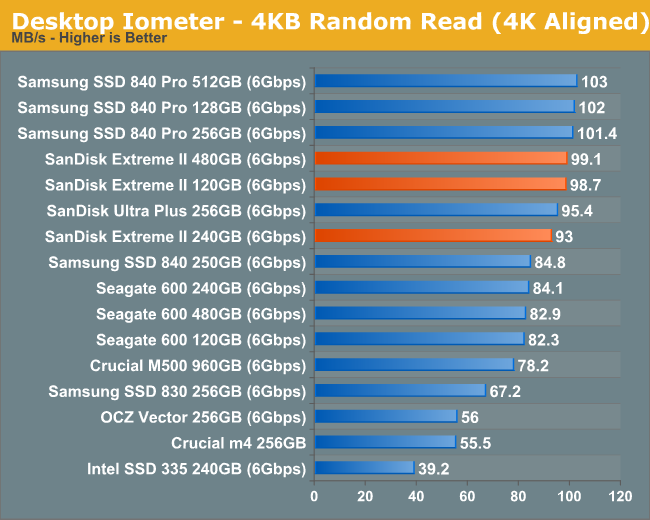
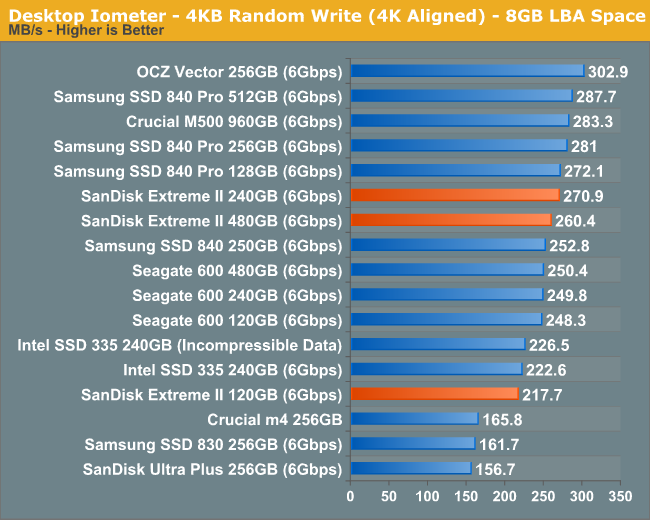
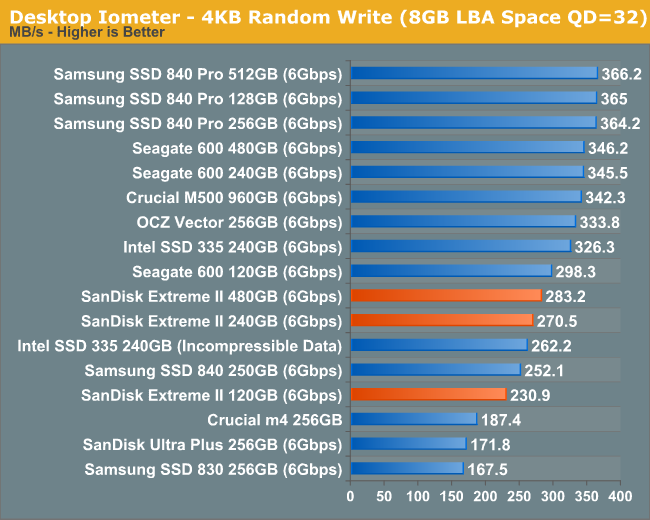
Sequential Read/Write Speed
To measure sequential performance I ran a 1 minute long 128KB sequential test over the entire span of the drive at a queue depth of 1. The results reported are in average MB/s over the entire test length. Sequential IO performance is very good on the Extreme II, effectively equalling the performance of Samsung's SSD 840 Pro.
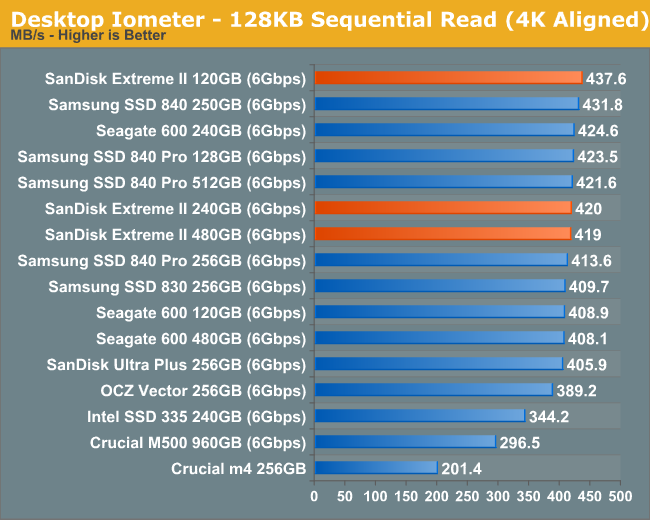
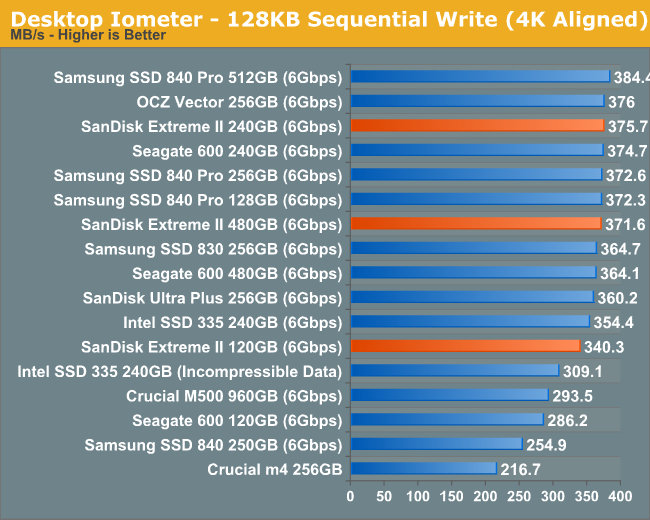
AS-SSD Incompressible Sequential Read/Write Performance
The AS-SSD sequential benchmark uses incompressible data for all of its transfers. The result is a pretty big reduction in sequential write speed on SandForce based controllers.
As a client focused drive, it's no susprise that the Extreme II does well in all of the sequential tests. I did notice consistently higher sequential read performance on the lower capacity Extreme II for some reason, but the gap isn't large enough to be significant. On the sequential write side, the 120GB drive is appreciably slower than the 240 and 480GB models simply because of the reduction in NAND die count.
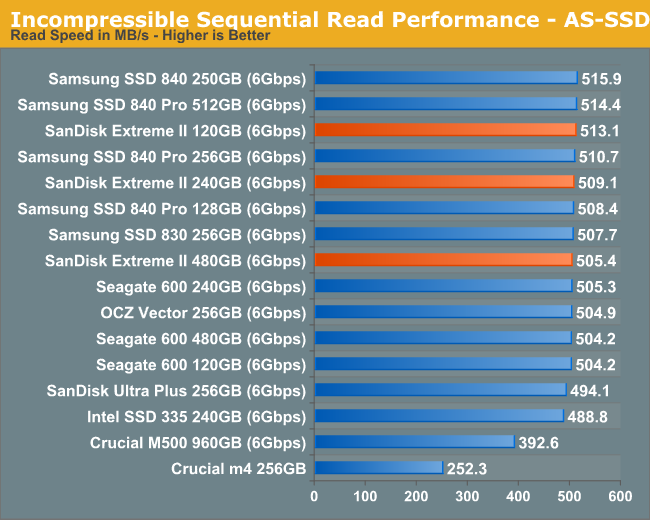
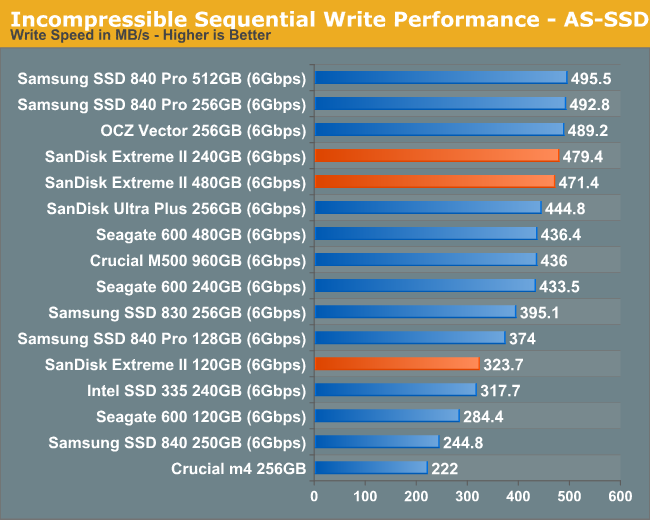










51 Comments
View All Comments
HardwareDufus - Monday, June 3, 2013 - link
Amazing. I am using an OCZ Vertex4 256GB drive. Bought it last Nov for about $224. Very happy with it.This SanDisk drive is the same price ($229), same capacity (240GB), same format. However, it is performing a full 5% to almost 100% better, depending on block size, random/sequential, read/write activity. Amazing what 7 to 12 months has brought to the SSD market!
Vincent - Monday, June 3, 2013 - link
You wrote: "In our Intel SSD DC S3700 review I introduced a new method of characterizing performance: looking at the latency of individual operations over time"In fact this is not what your test does. Your test records IOPS in one-second periods, but does not measure the latency of individual IOs. It would in fact be interesting to see the latency distribution for these drives.
Tjalve - Tuesday, June 4, 2013 - link
Ive done som IO Latency tests based on my own trace-based benchmark if your interested.http://www.nordichardware.se/SSD-Recensioner/svens...
http://www.nordichardware.se/SSD-Recensioner/svens...
http://www.nordichardware.se/SSD-Recensioner/svens...
The text is in swedish, but you should be able to understand the graphs. I could make aplot diagram of individual IOs Latency if anyone is interested,
kallogan - Tuesday, June 4, 2013 - link
I still have an indilinx 64GB.dishayu - Tuesday, June 4, 2013 - link
Is it just me or have the SSD prices stagnated since the past year or so? I bought a 120GB Plextor M5S for $85 in July 2012 and the 128 GB SSDs still seem to hover in the 100-120$ range.sna1970 - Tuesday, June 4, 2013 - link
Hey Anand , can you please test 6 SSD Raid 0 with the new Haswell Z87 motherboards ?we need to make sure we can hit 3G/s , what is the maximum bandwidth of the new chipset ?
cbk - Tuesday, June 4, 2013 - link
This looks awesome, it's almost neck-to-neck to the 840 Pro, at a lower price.jeffrey - Tuesday, June 4, 2013 - link
Hi Anand,Do you plan on covering the OCZ Vertex 450?
jeffrey - Tuesday, June 4, 2013 - link
Press Release:http://ocz.com/consumer/company/newsroom/press/ocz...
Kristian Vättö - Tuesday, June 4, 2013 - link
All tests have been run but I guess Haswell and other Computex stuff got on the way.